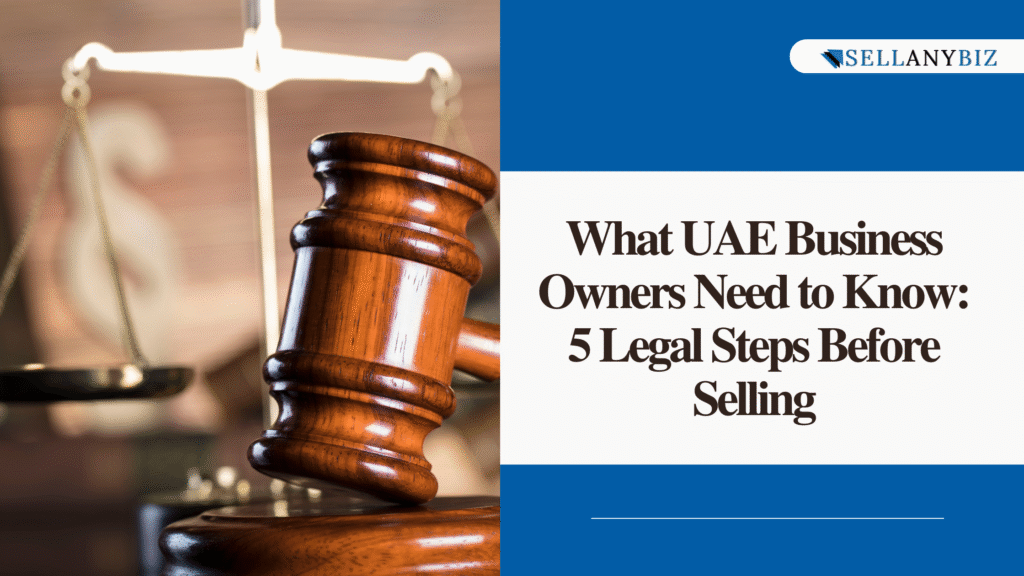Selling a business in the UAE is not just another deal. It marks a big milestone in the journey of an entrepreneur. Whether you’re bustling through Dubai or working in the calm atmosphere of Abu Dhabi, understanding the legal processes is key for making your exit hassle-free. Let’s go through this process together so you’re ready to handle a smooth and successful sale.
Step 1: Organize All Your Documentation
Picture yourself in the buyer’s shoes—would you put your money into a business that’s disorganized? The first thing you need to do is make sure all business licenses and paperwork are current. Focus on these tasks:
- Make necessary changes to your Memorandum of Association (MOA) if adjustments are needed.
- manage lease agreements, permits, and compliance papers to ensure they are in order.
- Organize employee visas and contracts in an orderly way.
Having your paperwork ready speeds up the due diligence process and encourages trust from potential buyers.
Step 2: Know Your Business Structure
Businesses in the UAE operate under different structures with their own rules. Are you selling shares in a limited liability company (LLC) or passing on assets like inventory and equipment? It is important to recognize this difference, as it has an impact on how the sale process works and what tax considerations might come up. For instance:
- Mainland LLCs need permission from the Department of Economic Development (DED). On the other hand, free zone companies must get clearance from their specific governing bodies.
Step 3: Get Ready to Meet Buyer Due Diligence
When it’s time to sell, expect buyers to dig into the details during due diligence. They’ll ask to review key documents like lease contracts and financial records. Use this checklist to gear up:
- Have up to 3 years of audited financial records (if relevant) ready to share.
- Be prepared to show your VAT registration and filing history if your yearly revenue reaches AED 375,000 or more.
- Provide documentation for any litigation or debts that remain unsettled.
- Share information about trade name registrations or intellectual property rights.
Clear communication matters a lot in the UAE. Keeping your paperwork in order and sharing it shows you’re professional and helps gain trust from possible buyers.
Step 4: Create a Sale and Purchase Agreement (SPA) That is Binding
The Sale and Purchase Agreement has the main conditions of the deal and needs legal enforceability based on UAE civil and commercial law. You should ask a skilled legal expert in the UAE to either write or check this contract. An SPA contains:
- The selling price and payment terms.
- Details about what the sale covers (like shares, licenses, or assets).
- Requirements needed to close the transaction.
- Non-compete agreements to stop the seller from running a similar venture.
- Warranties and legal protections against hidden liabilities.
- Plans for staff transitions and who handles end-of-service payments.
In the UAE, not having a enforceable SPA might result in confusion, conflicts, or even legal problems. Some emirates or free zones may ask for notarization based on the sale type.
5. Finalize Government Approvals and Transfer Ownership
After signing the agreement, you must handle the ownership transfer with government offices. The steps for this vary a bit between mainland and free zone setups.
Mainland Companies:
- Go to the Department of Economic Development (DED) to adjust the trade license.
- Complete the share transfer at a notary if it is an LLC.
- Make sure the commercial registration is updated under the Ministry of Economy, but if this step applies.
- Through the Ministry of Human Resources and Emiratisation (MOHRE), either cancel or move any existing employee visas.
- Inform the utility companies and your landlord about the ownership switch.
Businesses in Free Zones:
- Request approval for share transfer from the free zone authority.
- Provide necessary documents, including NOC from existing shareholders, board resolutions updated passport copies, and license copies.
- Settle the license amendment fees and update the shareholder register with the new details.
- Complete any adjustments related to visas or employees through the free zone’s system.
In every situation, the **ownership transfer becomes official ** after the relevant authority approves and records the changes in their system.
Conclusion
Selling a business in the UAE involves several legal steps that need proper planning and time. Getting the right advisors and following the rules helps you prepare, handle documents, and complete the process well. This sets you up to finalize the sale and make a good profit.
SellAnyBiz helps UAE entrepreneurs buy and sell businesses with clear processes legal advice, and marketing help. They assist with everything, like creating listings and handling ownership transfers supporting you through the entire process.























